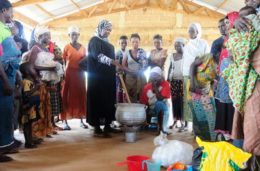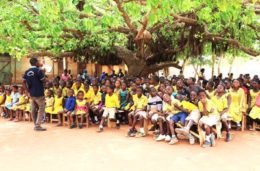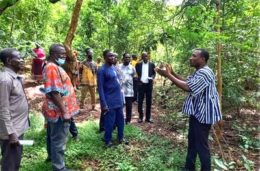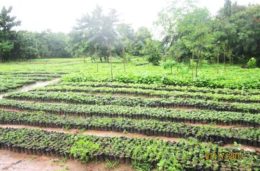Agroécologie Afrique de l’Ouest
– Ghana –
Ghana Permaculture Institute
– GPI –
Dr Paul Yeboah started the institute in 2004 with the support of Greg Knibbs, an Australian professor of permaculture. At that time GPI was a network (GPN) created to connect and work with rural, low-income smallholder farmers in Ghana.
Since its establishment, the Institute has trained a lot of farmers, other institutes, as well as individuals on best farming practices, new and improved farming methods and processing of farm produce into finished products among others and this has led to winning multiple awards both locally and internationally
Paul Yeboah (1970 – 2021) was an educator, farmer, permaculturist, community developer, and social entrepreneur. Yeboah founded and coordinated the Ghana Permaculture Institute
Dr. Agnes Ameyaa is the Director of GPI and Ankomah Louis,certified in alternative medicine in 2018 by the Council of Traditional Medicine and Herbal Medicine, is the head of the clinic here at GPI
What is permaculture ?
Within permaculture systems work is minimized, “wastes” becomes resources, productivity and yields increase, and the environment is restored.
Permaculture aims to create stable productive systems that provide for human needs, harmoniously integrating the land with the people not only for today but also the future.
A demonstration and education site
They have a production site where they practice permaculture in Tanoboase, not fare from Techiman.
It was formerly, 24 acres of degraded land and infertile soil. Since Director Paul Yeboah started working on the land in 2011, he and his team have transformed the landscape.
Permaculture has made it possible to grow food and cash crops where it previously didn’t seem possible. The barren, gravel landscape is now green and host to a variety of wildlife.
There, permaculture activities and practices can be implemented and showcase to students, farmers and other people in the community.
The development of the demonstration and training center allows individuals to acquire practical knowledge and experience, more effective than in purely theoretical teaching methods. This has proven effective in sharing essential permaculture practices with everyone, including the illiterate.
What GPI do ?
– To empower Women and girls GPI works to mobilise financial, human and material resources
– To young and students it offers accredited permaculture design courses, enabling them to apply permaculture principles to their lives and livelihoods.
– GPI manages an Alternative Medecine center : the clinic draws on traditional knowledge by coming back to natural and herbal medicine. We are working to promote dialogue between GPI and traditional healers, as well as to combine traditional medicine with scientific evaluation.
– Sustainable Livelihood programmes. A set of training courses to improve sustainable livelihoods.
– Outreach permaculture design course. The way it is taught is very practical.
– Tree nurseries (fruit trees, cocoa, cashew, trees for timber, medicinal and indigenous trees as well as nitrogen fixers that improve the soil and nourish degraded land). Bee keeping, Moringa.
– Bee-keeping GPI itself has 200 beehives and provides hands-on training in beekeeping here in our demonstration center.
– GPI grows mushrooms which provide valuable nutritional value to a healthy and balanced diet.
– The Center processes many agricultural products into finished products : honey, moringa powder, soya flour, shea butter, baobab powder and many kind of oil : moringa, tiger-nut, baobab, lemon grass, neem, coconuts
The Influence of the Center
The Institute shares permaculture knowledge with schools, teaching children about health care, earth care and enterprise.
Since 2004, it has established 50 community nurseries and continues to offer advice and training to local farmers. Currently, it networks with over 8,000 farmers.
Until now, GPI has taught 3000 farmers about bee-keeping and they are now seeing results through integrating it into their crop production.
Through its tree nursery project GPI donated trees to schools, community organisations, and farmers.
In 2008 GPI donated over 35,000 trees to the United Nation Trees for Africa program and continues to give away thousands of trees, teaching people how to design food gardens and control the severe erosion and degeneration of the environment around their homes.
From 2013-2018, it implemented sustainable development projects with the Southern Network for Environmental Development and BMZ (German Ministry for Economic Cooperation and Development) through which GPI expanded its network to West African Countries such as Togo and Burkina Faso
CONTACTS and LINKS
Ghana Permaculture Institute – GPI
– Address : P. O. Box TM 390, Techiman – Ghana.
– Tel : +233 (0) 24 98 92 457 // +233 (0) 24 37 02 596 // (0) 26 53 84 957
– Mail : permacultureghana@gmail.com
– Site : https://www.ghanapermacultureinstitute.org/
See also other agroecological actors in West Africa
In Ghana and also in Niger, Ivory Coast, Togo, Mali, Burkina Faso, Benin and Senegal
The Google Maps
On the map, choose an icon (then “more info” on mobile). You will find notices with contacts (when we found them), links, photos and sometimes videos.
Mil’Ecole – Mars 2024





